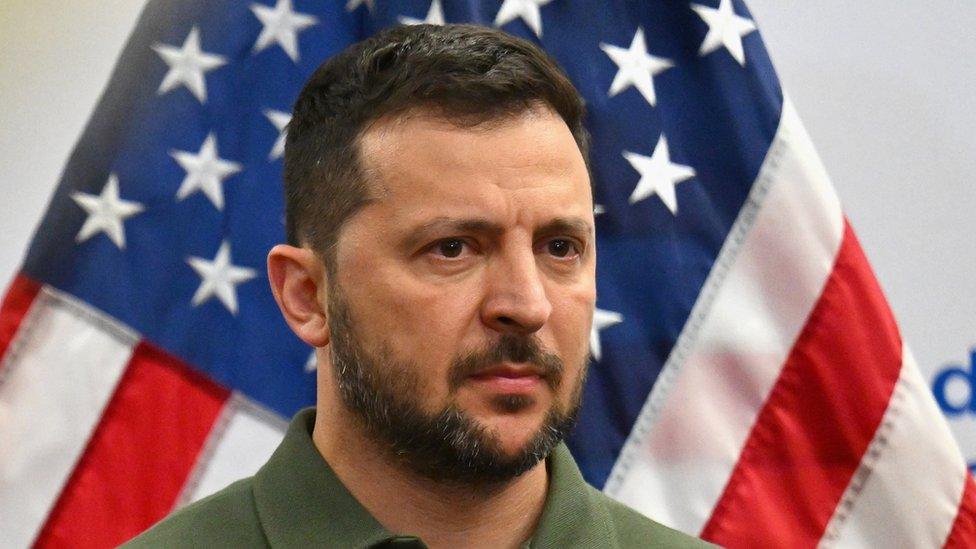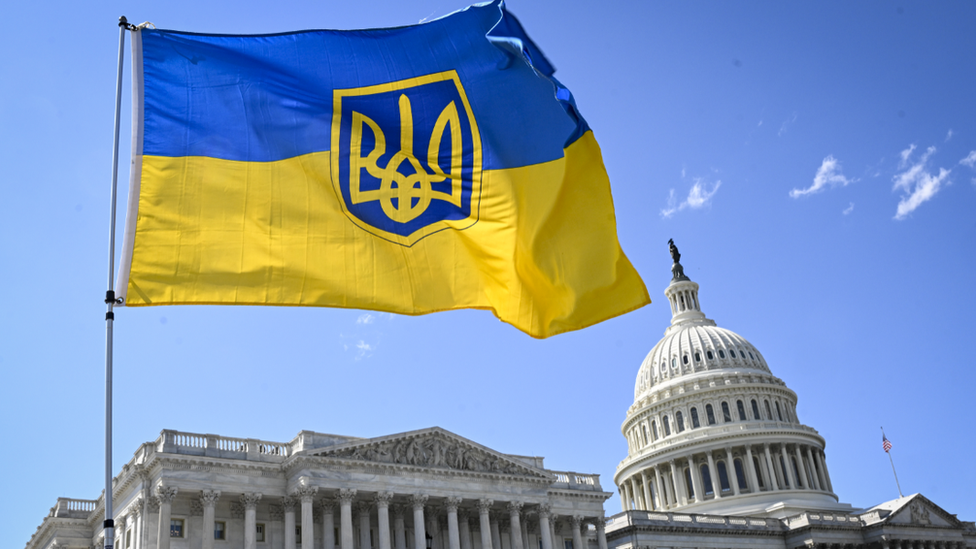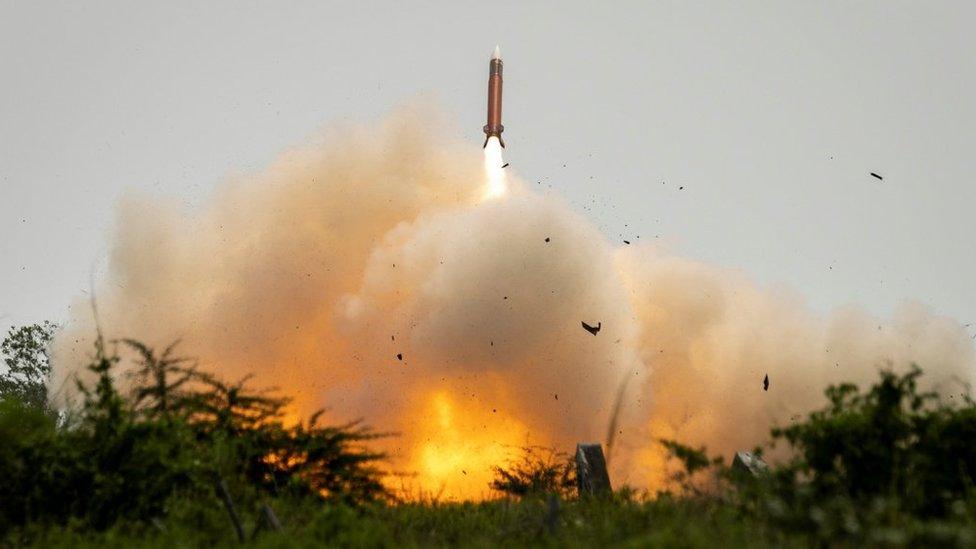Biden vows to 'quickly' supply new military aid to Ukraine
- Published
Watch: Moment a Kharkiv TV tower collapses after a Russian missile strike in Ukraine
Joe Biden has told Volodymyr Zelensky he will "move quickly" to send Ukraine fresh military aid, after US lawmakers passed a $61bn (£49bn) support package.
The House of Representatives approved the bill on Saturday after months of political gridlock in the chamber.
Mr Biden promised "significant" support for Kyiv - including more air defences - if senators approve the bill as expected on Tuesday.
The assurances come as Russian attacks destroyed a TV tower in Kharkiv.
Footage showed the red and white tower collapsing seconds after Russian missiles slammed into it on Monday afternoon in the eastern Ukrainian city, which lies just 19 miles (30km) from the Russian border.
Local officials said there were no casualties in the attack, with regional Governor Oleg Syniehubov writing on social media that staff were in a shelter at the time.
But Mr Syniehubov said the attack had disrupted television broadcasting in the region.
Kharkiv has been targeted in relentless air attacks by Russian forces in recent weeks. In a social media post after the attack, President Zelensky wrote that it was "Russia's clear intention to make the city uninhabitable".
He added that he had informed President Biden of the strike, which he said happened just before their call on Monday.
In a readout of the call released by the White House, President Biden said his administration had a "lasting commitment to supporting Ukraine as it defends its freedom against Russian aggression".
The White House also said Mr Biden had committed to helping Ukraine "maintain financial stability, build back critical infrastructure following Russian attacks, and support reform as Ukraine moves forward on the path of Euro-Atlantic integration".
The aid package approved by the House on Saturday includes more than $9bn (£7.28bn) of economic assistance in the form of "forgivable loans" - ones that do not need to be paid back.
Mr Zelensky welcomed Mr Biden's comments, and a top aide to the Ukrainian leader - Mykhailo Podolyak - said the fresh US aid had given the war-weary nation a welcome boost.
But Moscow has enjoyed significant momentum in the conflict in recent weeks, notching up a series of victories in the east of the country.
And Mr Zelensky has warned that Russia will likely seek a major battlefield success ahead of Victory Day - a state holiday celebrating the defeat of Nazi Germany - on 9 May.
He suggested that Moscow could seek to seize Chasiv Yar, a small town in Donetsk region, ahead of the holiday. Chasiv Yar lies just west of Bakhmut, the ruined city captured by Russia last year after months of bloody fighting.
Military commanders in Kyiv have said Chasiv Yar, which has been virtually emptied of its pre-war population, would open up a path towards the Ukrainian-held cities of Kostiantynivka, Kramatorsk and Sloviansk if captured by Moscow's forces.
Russia's defence ministry also claimed it had seized the town of Novomykhailivka, also in Donetsk region, on Monday. The BBC cannot independently verify the claim, and Ukrainian defence officials said earlier that their forces had held back Russian advances on the village.
Kyrylo Budanov, the head of Ukrainian military intelligence, told the BBC's Ukrainian service on Monday that Kyiv's forces faced "a rather difficult situation" in the coming weeks.
Lt Gen Budanov conceded that the Russian seizure of the town of Avdiivka was "a real success" for them. But he said while the battlefield situation may worsen in the coming weeks for Ukraine, it would not be "catastrophic".
"Armageddon will not happen," he added.
President Biden also spoke to European Commission President Ursula von der Leyen on Monday.
In a readout of the call released by her office, Ms von der Leyen said the pair discussed "their steadfast support for Ukraine as it defends against Russian aggression" and "how sustained international support is vital to Ukraine's fight for freedom".
Meanwhile in Moscow, a Russian man has been sentenced to five years of "correctional labour" for providing a comment critical of the invasion of Ukraine to a US publication.
Yuri Kokhovets was accused of spreading "fakes about the army" for providing a quote critical of the war and of President Vladimir Putin to the US-funded Radio Free Europe in February 2022.
It is the first known prosecution of a Russian citizen for expressing an opinion to a foreign journalist.
Related topics
- Published21 April 2024

- Published21 April 2024

- Published19 April 2024
